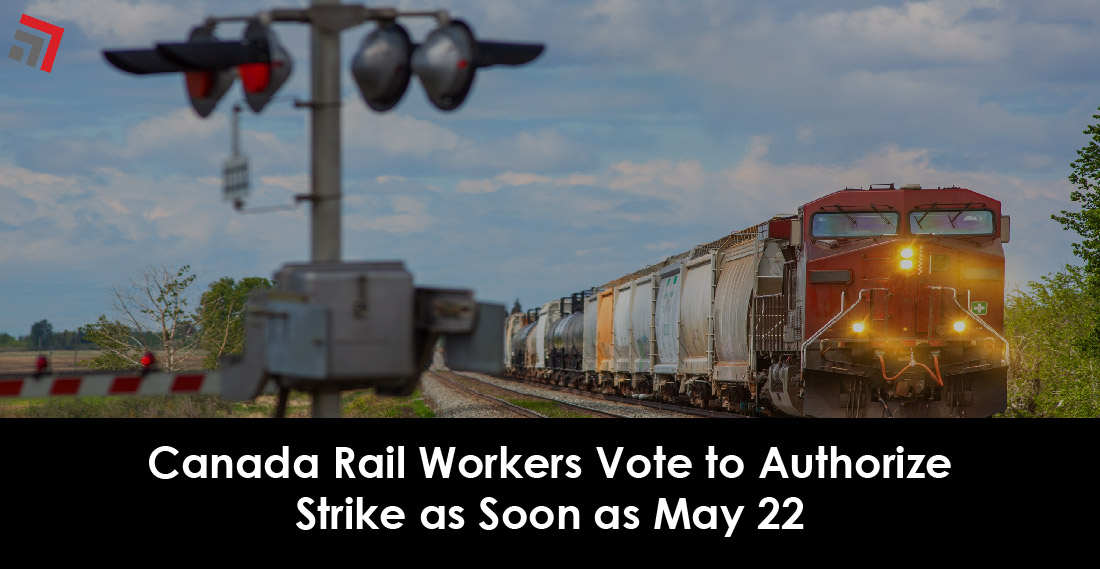Unionized rail workers across Canada’s two Class I railroads have voted nearly unanimously to authorize a strike as soon as May 22.
98 percent of Teamsters Canada Rail Conference’s (TCRC) rank-and-file members ruled in favor of picketing if new collective bargaining agreements are not reached between their union and their railway employers Canadian National (CN) and Canadian Pacific Kansas City (CPKC).
Since Mar. 1, federal mediators have been tapped to help broker a labor deal for the two sides but have been unsuccessful. With no agreement in place after a May 1 “conciliation period” deadline, a mandatory 21-day “cooling off” period is underway, forbidding any strike action from workers or lock outs by the railroads. However, this cease-fire will expire on May 22, thus allowing the first chance for either side to take labor-related actions.
As the vote of approval suggests, Canadian rail workers are prepared to strike as soon as they are legally permitted to do so. In the event of a strike, TCRC is required to issue a 72-hour notice in advance, which may come as soon as May 19.
TCRC and railways CN and CPKC have been tasked with renewing three collective agreements that cover nearly 9,300 employees of the railroads. So far, capturing a favorable deal has been futile for the two sides. Over the past few months, both the union and railroads have exchanged barbs, blaming the other side for failing to cooperate.
On Feb. 16, CN and CPKC filed notices of dispute with Canada’s labor ministry, seeking the assistance of federal mediators to assist with their negotiations. The Canadian government followed suit, appointing mediators on Mar. 1 who presided over the negotiations up until May 1.
The railways’ February filing is what initiated the possibility of a strike in the first place. Under Canadian law, a work stoppage may occur as soon as 81 days after a notice of dispute is filed. Hence, why a strike could happen May 22 if authorized by the workers.
Of the nearly 9,300 unionized rank-and-file workers, 6,000 are employed by CN, while 3,200 are employed by CPKC. Their body consists of conductors, yard coordinators, and train engineers. The previous collective agreements expired Dec. 31, however, under Canadian law, the agreements will remain in effect until the two parties reach new terms.
Western Canada ports especially vulnerable if rail strike occurs
If a strike were to materialize, the entire transportation network of Canada would be subjected to disruptions, however Western Canada would by far be the most vulnerable.
The western half of the country has a dependence on freight rail transportation, particularly for cargo to and from Canada’s West Coast ports of Vancouver and Prince Rupert. CN is the exclusive railroad that accesses Prince Rupert, a small port town in northwest British Columbia, and transports the vast majority of cargo that goes through the town’s port. While, Vancouver, Canada’s busiest port, regularly sees half of its throughput moved via rail. The timing of a potential strike is also precarious for Vancouver’s operations as rising import volumes and railcar shortages are already challenging the port’s intermodal movement.
Final Thoughts
The labor rift between CN, CPKC, and TCRC that has prevented the two sides from forging an agreement rests on differences between three core issues: salaries; work-life balance; and rest periods.
Regarding salaries, the railroads are advocating for a pay model that would replace the existing per-mile pay for conductors and engineers with hourly wages. CN and CPKC claim this change will raise worker wages, while TCRC refutes this and argues more than half of the workforce will earn less until the proposed changes in pay take effect.
If a strike were to occur, the event would not be in the first labor-related instance to happen on Canada’s rail networks. In recent years, TCRC has engaged in strike actions across both railroads’ networks.
In 2019, unionized CN workers held a strike over issues of fatigue and rail safety. In 2022, a work stoppage impacted CPKC’s operations, hindering freight rail movement across Canada.
In the previous decade, work stoppages also occurred in 2012, 2015, and 2018.
Contact one of our team members if you have any questions regarding this topic or any others in domestic logistics.
More blogs similar to this:



Recent Comments